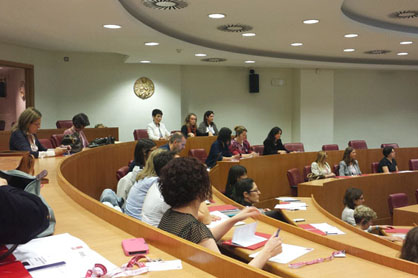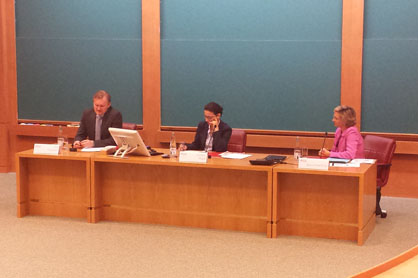How to apply in Spain the Norwegian family policy
 Nordic family policy is recognized worldwide for the progress towards gender equality and work-life balance and for its good economic results. But, such measures can be implemented in Spain? 'Leadership, Diversity and Work-Life Balance' Seminar, financed by the EEA Grants, put the issue into the limelight.
Nordic family policy is recognized worldwide for the progress towards gender equality and work-life balance and for its good economic results. But, such measures can be implemented in Spain? 'Leadership, Diversity and Work-Life Balance' Seminar, financed by the EEA Grants, put the issue into the limelight.
04.11.2014
Female participation in Spanish labour market has doubled since the 1980s, more than 60% of bachelors are women, but still women presence on boards is minimal and women earn 18% less than their male colleagues, as Carmen Plaza, Women’s Institute General Director, recalled in the opening of the Seminar Leadership, Diversity and Work-Life Balance, financed by the EEA Grants.
What can be done to change these figures? Norway can be an example. “Quotas Law approved in 2003 has contributed to increase the number of women on Boards from 6% in 2002 to 41% in 2014, but this law is not enough. The agreement between Government, companies and unions in order to implement flexible working day has been a major step forward”, explained Lars Andersen, from the Norwegian Embassy in Spain. Furthermore, there are specific measures which are giving great results in this country, like parental leaves programme, cash-for-care programme or formal child care.
 For example, when a child is born in Norway, a year of paid leave and another year of non-paid leave can be added to the maternity and paternity leaves. Moreover, there is a public and subsidized system of kindergarten accessible to all families, but if the parents decides not to use it, cash-for-care programme provides for payments of up to 450 euros per month for children aged 13 to 36 months.
For example, when a child is born in Norway, a year of paid leave and another year of non-paid leave can be added to the maternity and paternity leaves. Moreover, there is a public and subsidized system of kindergarten accessible to all families, but if the parents decides not to use it, cash-for-care programme provides for payments of up to 450 euros per month for children aged 13 to 36 months.
Trude Lappegard, Senior Researcher in Statistics Norway, pointed out that despite the positive effects of these measures, such as fostering incorporation of women to the labour market, “it its important to stress that the benefits must be put into context and they are not necessarily transferable to other countries”. Besides that, some research show that these measures not cause an automatic increase in fertility rate, one of the main challenges in our societies.
The expert considers that work-life balance goes beyond these measures. “It is the possibility of staying at home when the children are sick or to hold meetings no later than 4 p.m.”. But above all, these steps requires a change of mentality.
Leadership, Diversity and Work-Life Balance Seminar, organized by the Spanish Ministry of Health, Social Services and Equality and with the collaboration of IESE, is part of the EEA Grants Gender Equality Programme, whose aim is reducing disparities between men and women.